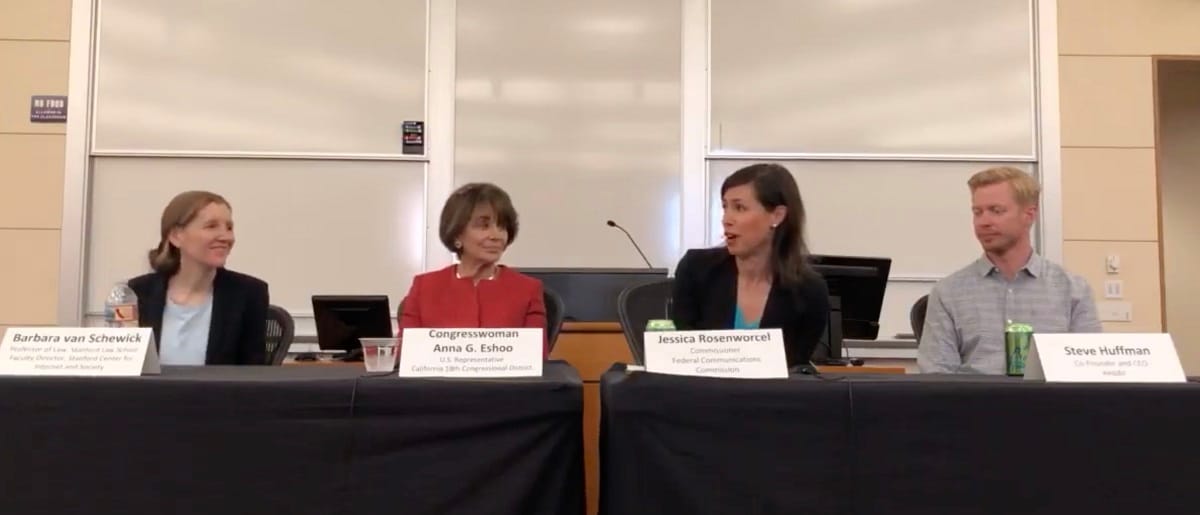Verizon’s Throttling of Santa Clara County Firefighters Discussed by Panel of Net Neutrality Advocates
May 31, 2019 – Verizon Wireless’ slowdown of the Santa Clara County Fire Department’s data plan had a “significant impact” on the department’s ability to respond to last year’s wildfires, according to testimony by Fire Chief Anthony Bowden that featured prominently in a Thursday discussion at the St
Em McPhie

May 31, 2019 – Verizon Wireless’ slowdown of the Santa Clara County Fire Department’s data plan had a “significant impact” on the department’s ability to respond to last year’s wildfires, according to testimony by Fire Chief Anthony Bowden that featured prominently in a Thursday discussion at the Stanford Center for Internet and Society.
The incident from the summer of 2018, when county firefighters were battling one of a series of deadly California wildfires, was cited as a parable about the effects of the Federal Communications Commission’s December 2017 repeal of the Obama-era FCC’s net neutrality regulations.
In a declaration filed in the Mozilla v. FCC lawsuit over the repeal, Chief Bowden said that “Verizon imposed these limitation despite being informed that throttling was actively impeding County Fire’s ability to provide crises-response and essential emergency services.” He provided email documentation showing that delivery speeds of 20 Megabits per second (Mbps) down / 7 Mbps up had been throttled to 0.2 Mbps down / 0.6 Mbps up, “meaning it has no meaningful functionality.”
Net neutrality advocates at the event – including Rep. Anna Eshoo, D-Calif. – said that Verizon’s callous restriction on what the firefighters believed was an unlimited data use plan was a result of FCC Chairman Ajit Pai’s removal of neutrality regulations.
Verizon’s behavior in limiting the bandwidth of emergency firefighters was widely denounced at the time. The company disavowed its policy when the controversy hit the headlines in August 2018.
Some of Verizon’s defenders have said the company’s legal ability to restrict bandwidth would not have been forbidden under the 2015 rules, citing language in the agency’s since-repealed 2015 Open Internet Order which notes that the no-throttling rule “does not address a practice of slowing down an end user’s connection to the Internet based on a choice made by the end user.”
Net neutrality advocates Gigi Sohn and Ernesto Falcon, of the Electronic Frontier Foundation, dispute that interpretation. Falcon wrote that “when the FCC repealed that order, it not just ended a ban on blocking, throttling, and paid prioritization, it also declared federal laws that would be directly applicable to Verizon’s conduct to no longer apply.”
The Stanford panel emphasized the perspective of net neutrality supporters, including a discussion about their tactical efforts to restore regulations.
Rep. Eshoo views bipartisan support for net neutrality
Eshoo, who represents an area near Stanford and in the heart of Silicon Valley, highlighted the bipartisan support that net neutrality has from the American people. A recent study from Comparitech found that 87 percent of Democrats and 77 percent of Republicans support net neutrality.
By contrast, the issue is fiercely partisan on Capitol Hill. The Democrats’ “Save the Internet Act,” which would restore the FCC’s 2015 rules by overruling the 2017 repeal, passed in the House of Representatives last month. But Senate Majority Leader Mitch McConnell called it “dead on arrival in the Senate.”
At the Thursday event, Eshoo also discussed common arguments against net neutrality, such as the fear that it will kill investment. She pointed out that the Securities and Exchange Commission requires companies to inform shareholders of anything hurting profitability or investment potential, and companies have not reported being hurt by neutrality rules.
“Without net neutrality, companies like YouTube or Netflix would not exist,” said Reddit CEO Steve Huffman. “The protections that net neutrality provide allow companies that were once tiny to grow into very successful businesses.”
Also speaking at the event was FCC Commissioner Jessica Rosenworcel, who voted against the repeal. She highlighted the need for more broadband competition, and said half of American households have no choice in broadband provider, citing the FCC’s own data. That leaves them vulnerable to whatever policies their provider chooses to enforce.
Stanford Law Professor Barbara van Schewick emphasized that more competition would not necessarily solve the problem of net neutrality, citing the European Union’s simplification of internet laws in 2008.
Although there was a great deal of competition, the simplified laws “failed spectacularly,” leading to “widespread discrimination.” In 2015, the EU adopted a new policy modeled after the FCC’s open internet rules.
(Screenshot from Thursday’s event at Stanford Law School.)









Member discussion